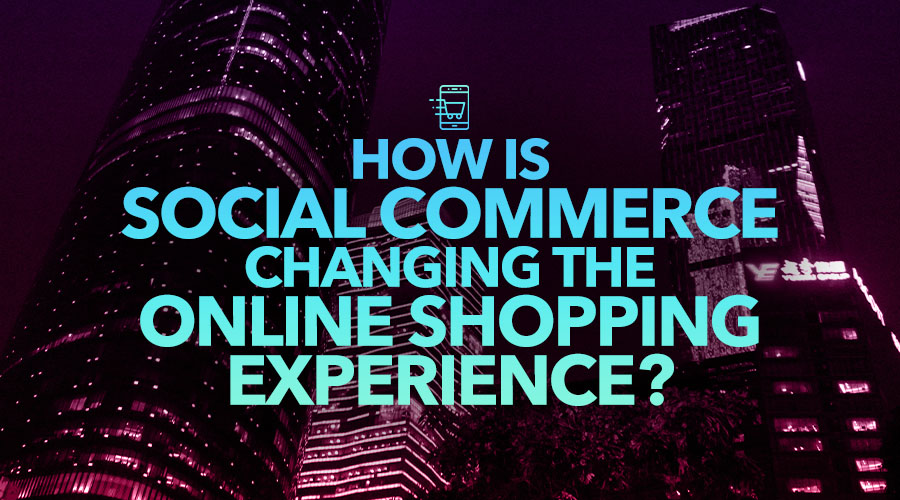How is Social Commerce Changing the Online Shopping Experience?
Published on 9th of August 2022Social media is increasingly playing a role in how people shop. Until now, shopping behavior was limited to checking out on a brand or retailer site.
Today, social channels offer the opportunity to browse and buy entirely within one connected platform. This development has the potential to transform online shopping completely.
Social commerce/shopping is the practice of selling products directly on social platforms. This approach revolutionizes the e-commerce industry, as the global social commerce market has recently reached $89.4 billion.
What drives the rapid shift toward social commerce, and how can brands generate more sales with this? But first…
What is social commerce?
 In social commerce, everything happens on social media—from product discovery and click-to-purchase to customer support. This makes it a one-stop shop for people to browse and buy your products.
In social commerce, everything happens on social media—from product discovery and click-to-purchase to customer support. This makes it a one-stop shop for people to browse and buy your products.
Social commerce is a fully streamlined sales funnel that takes customers from discovery to checkout in seconds.
The concept is not new, but it was speeded up in 2020 due to COVID-19. Many small businesses turned online to connect with their customers and sell their products.
A spike of new customers now need social selling tools and as a result, the platforms started evolving too:
-
Facebook introduced Shops, which is an e-commerce feature allowing brands to run online stores on Instagram and Facebook
-
Instagram Checkout allows users to purchase without leaving the app
-
Pinterest launched a Shop tab for users to browse and shop in-stock product pins
-
TikTok Shopping is also expected because of its latest Shopify partnership
According to Business Insider’s reports, social commerce is expected to reach 4.3% of all retail e-commerce sales in the United States, in 2021. That's a whopping $36.09 billion.
How is social commerce important for small businesses?
 For startups and little businesses, it’s time to go where the customers are spending much of their time. And interestingly, buyer habits have shifted to social media in a big way:
For startups and little businesses, it’s time to go where the customers are spending much of their time. And interestingly, buyer habits have shifted to social media in a big way:
-
48% of Americans use social media for discovering and buying their favorite products
-
60% of Gen-Zers in the United States use Instagram to find new products and brands
Instagram has become a personalized virtual shopping mall, where you can browse new brands, chat with customers, find inspiration, and purchase products in a few minutes. In other words, social commerce will become a customized shopping experience in the future.
How is social commerce evolving?
Social platforms are already focusing on social commerce, launching new shopping features and buttons to drive more engagement.
For example;
-
Facebook Shops: It helps businesses create digital storefronts that act as product collections. Facebook wants to imitate the "pleasure of shopping versus the chore of buying."
In short, Facebook Shops mimics the experience of searching in a physical store but from the comfort of your home.
It's challenging for online vendors to replicate the real shopping experience. But if Facebook can do this, it could be a real threat to many physical stores that don’t have an omnichannel system in place.
-
Snapchat’s Shoppable Show: Snapchat is taking significant steps in the social commerce arena. They have announced a new show, "The Drop," that would feature limited-edition "costume collaborations with designers and celebrities.’’ Customers will be able to shop directly from the screen as they watch.
Snapchat is continuously looking for ways to monetize its 90% Gen-Z user base because its previous partnership with Adidas was successful. The initiative of live shoppable shows is the next step in becoming a direct sales platform.
-
Pinterest merged users' cameras into social shopping: All you need to do is take a photo of your favorite products, and Pinterest will show you similar products on its website, which will then link to the product on the seller’s site.
-
Ex-Starbucks and Google officials joined hands to launch a platform called Tuli. The app is designed to assist restaurant traders. Tuli lets restaurant customers, managers, and influencers connect.
Consumers can also order food for delivery or takeaway, straight from the posts and photos on the platform. It launched in August 2020, so it'll take some time to see how successful it becomes.
How do business owners see social shopping?
 Since the pandemic started, there has been something of a flight of buyers to digital shopping and omni-channels.
Since the pandemic started, there has been something of a flight of buyers to digital shopping and omni-channels.
Countries like the US and UK have seen a growth of more than 30% in online shopping, and France has also seen a significant progression. In this situation, brands need to review their social commerce strategies.
A study on social commerce questioned sellers that are already working on social media. It found that:
-
73% of retailers believe that their business has already created an emotional bond with customers, and it's easier for them to achieve tremendous success with social commerce
-
44% of retailers struggle in developing a meaningful content marketing strategy
-
62% of respondents said social commerce had helped them to improve communication with customers
-
92% said their preferred social platform for commerce is Instagram; 77% of retailers opted for Facebook, 57% choose Twitter, and 47% choose Pinterest
Due to the nature of COVID-19, the trends toward social shopping won’t be diminishing anytime soon.
If brands want to benefit from this boom, they need to incorporate social commerce into their marketing strategy. Data insights can help you create emotionally engaging content that encourages consumers to take action.
The future of social commerce
 Here are some expert predictions on social commerce for 2022:
Here are some expert predictions on social commerce for 2022:
-
Brands that capitalize on visual content will be more successful
-
Every app will adopt Facebook’s shopping approach (from product discovery to purchase all within one platform)
-
TikTok will be the next big platform for social commerce
-
More people are expected to make purchases via videos (YouTube Shopping)
-
Social commerce's core will be online brand communities based on mutual values and trust between customers and brand
-
Social commerce's future lies in the hybrid between online brand communities, social platforms, and social shopping

